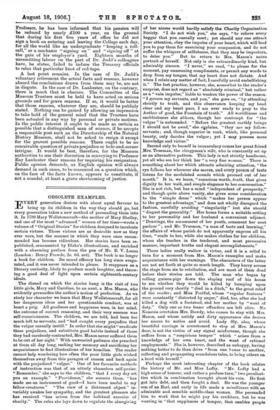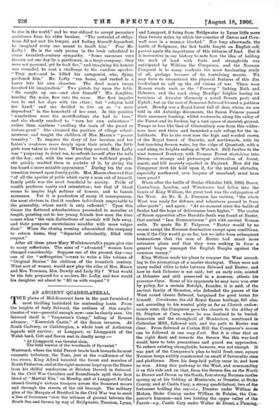OBSOLETE EXAMPLES.
The thread on which the stories hang is the visit of two little girls, Mary and Caroline, to an aunt, a Mrs. Mason, who evidently personifies the author's notion of perfection. As we study her character we learn that Mary Wollstonecraft, for all her dangerous ideas and her questionable conduct, was at heart a prig. All goodness and happiness were, in her mind, the outcome of correct reasoning, and their very essence was self-consciousness. The children, we are told, had been too much left to servants, and "had caught every prejudice that the vulgar casually instill." In order that she might " eradicate these prejudices, and substitute good habits instead of those they bad carelessly contracted, Mrs. Mason never suffered them to be out of her sight." With unwearied patience she preached at them all day long, racking her memory and sacrificing her acquaintance to find illustrations of her homilies. • The reader cannot help wondering bow often the poor little girls wished themselves away from this paragon of reason and back again with the prejudiced " vulgar." One of her favourite methods of instruction was that of an utterly shameless self-praise. "Remember," she says to the children, " that I every day set you an example." "Providence," she assures them, " has made me an instrument of good—I have been useful to my fellow-creatures." "The view of a distressed object" in- variably awakes her sympathy, and the greatest pleasure she has. received "has arisen from the habitual exercise of charity." The rules she lays down to regulate the almsgiving of her nieces would hardly satisfy the Charity Organisation Society. "I do not wish you," she says, "to relieve every beggar that you ,casually meet ; yet should any one attract your attention, obey the impulse of your heart, which will lead you to pay them for exercising your compassion, and do not suffer the whispers of selfishness, that they may be impostors, to deter you." But to return to Mrs. Mason's naïve portrait of herself. Not only is she extraordinarily kind, but admirably sincere. "I never," we read, "to please for the moment, pay unmeaning compliments, or permit any words to drop from my tongue, that my heart does not dictate. And when I relate any matter of fact, I carefully avoid embellishing it." The last practice, however, she, somewhat to the reader's surprise, does not regard as " absolutely criminal," but rather as a " vain impulse," liable to weaken the power of the reason. "I govern my servants, and you," she goes on, " by attending strictly to truth, and this observance keeping my head clear and my heart pure, I am ever ready to pray to the Author of good, the Fountain of truth." All worldliness and snobbishness she abhors, though her contempt for " the vulgar" is unbounded. "Before the greatest earthly beings I should not be awed," she eulains, " they are my fellow- servants ; and, though superior in rank, which, like personal beauty, only dazzles the vulgar ; yet I may possess more knowledge and virtue."
Second only to herself in immaculacy comes her great friend Mrs. Trueman, the clergyman's wife, who is constantly set up as an alternative pattern. This lady is not strictly handsome, yet all who see her think her " a very fine woman." There is something about her which attracts admiring attention, "the eye follows her wherever she moves, and every person of taste listens for the modulated sounds which proceed out of her mouth." It is, we learn, "conscious worth, truth, that gives dignity to her walk, and simple elegance to her conversation." She is not rich, but has a mind " independent of prosperity," and though quite above vanity, she gives some consideration to the " simple dress " which " makes her person appear to the greatest advantage," and does not wholly disregard the fashion, carefully avoiding " singularity " lest she should " disgust the generality." Her home forms a suitable setting to her personality and her husband a convenient adjunct. "Drawings, the amusement of her youth, ornament her neat parlour " ; and Mr. Trueman, "a man of taste and learning," the affairs of whose parish do not apparently engross all his time, "reads to her, while she makes clothes for her children, whom she teaches in the tenderest, and most persuasive manner, important truths and elegant accomplishments."
These ladies really wallow in virtue, and it is a relief to turn for a moment from Mrs. Mason's examples and make acquaintance with her warnings. The characters of the latter are not set forth at quite so much length. They burry across the stage from sin to retribution, and are most of them dead before their stories are told. The man who began by rolling guinea-pigs down the sloping roof of his house to see whether they would be killed by bumping upon the ground very shortly " died in a ditch," to, the great relief of the reader; and Miss Fretful, whose "regular features" were constantly "distorted by anger," died, too, after she had killed a dog with a footstool, and her mother by " want of duty." Only one or two lesser offenders are left alive. No Nemesis overtakes Mrs. Dowdy, who comes to stay with Mrs. Mason, and whose untidy and dirty appearance she desires her nieces to notice and 'avoid. Lady Sly, also, whose beautiful carriage is accustomed to stop at Mrs. Mason's door, is not the victim of any signal misfortune, though she suffers from a "suspicious temper" which " arises from a knowledge of her own heart, and the want of rational employments." She is, however, described as unhappy, having nothing better to do than drive " from one' louse to another, collecting and propagating scandalous tales, to bring others on a level with herself."
Perhaps the most interesting chapter of the book relates the history of Mr. and Miss Lofty. "Mr. Lofty had a high sense of honour, and rather a profuse turn," two peculiari- ties which in combination brought about his ruin. He first got into debt, and 'then fought a duel. He WAS the younger son of an Earl, and early in life made a misalliance with an admirable and. sensible 'middle-class woman. She persuaded him to work that he might pay his creditors, but he was wanting in " that suppleness of temper, that enables people to rise in the world," and he was obliged to accept pecuniary assistance from his elder brother. "The restraint of obliga- tions did not suit his temper, and feeling himself dependent, he imagined every one meant to insult him." Poor Mr. Lofty ! He is the only person in the book calculated to rouse twentieth-century sympathy. "Some sarcasms were thrown out one day by a gentleman, in a large company; they were not personal, yet he took fire," and imagining his honour was wounded, he sent a challenge to the careless speaker. " They met—and he killed his antagonist, who, dying, pardoned him." Mr. Lofty "ran home, and rushed in a hurry into his own chamber. The dead man's image haunted hie imagination." Two pistols lay upon the table. " He caught up one—and shot himself." The daughter, bearing the noise, flew into the room. Her first impulse was to end her days with the other; but "religion held her hand," and she decided to live on as "a mere dependent" in the household of her aunt. In this position "numberless were the mortifications she had to bear," and she shortly resolved to " earn her own subsistence " rather than continue "swelling the train of the proud or vicious great." She obtained the position of village school- mistress, and taught the children of Mrs. Mason's "poorer tenantry." To impress the story of her heroism and her father's weakness more deeply upon their minds, the little girls were taken to visit her. When they arrived, Miss Lofty was " preparing to drink tea, to refresh herself after the toils of the day; and, with the ease peculiar to well-bred people, she quickly enabled them to partake of it, by giving the tea-board a more sociable appearance." During tea the con- versation turned upon family pride. Mrs. Mason observed that "of all the species of pride which carry a man out of himself, family pride was the most beneficial to society. Pride of wealth produces vanity and ostentation; but that of blood seems to inspire high notions of honour, and to banish meanness. Yet it is productive of many ill consequences; the most obvious is, that it renders individuals respectable to the generality, whose merit is only reflected." Upon this theme the flattered schoolmistress proceeded to moralise at length, pointing out to her young friends bow soon the time comes when "the vain distinctions of mortals will fade away, and their pompons escutcheons moulder with more vulgar dust." When the closing evening admonished the company to return home, they " departed reluctantly, filled with respect."
After all these years Mary Wollstonecraft's pages give rise to many reflections. The aims of " advanced " women have changed considerably. Suppose one of the present day—say one of the " suffragettes "—were to write a like volume of " Original Stories " for children of the twentieth century. What sort of women would now play the roles of Mrs. Mason and Mrs. Trueman, Mrs. Dowdy and Lady Sly P What would be the fate prepared for a modern Mr. Lofty, and how would his daughter set about to " fill us with respect " P



































 Previous page
Previous page